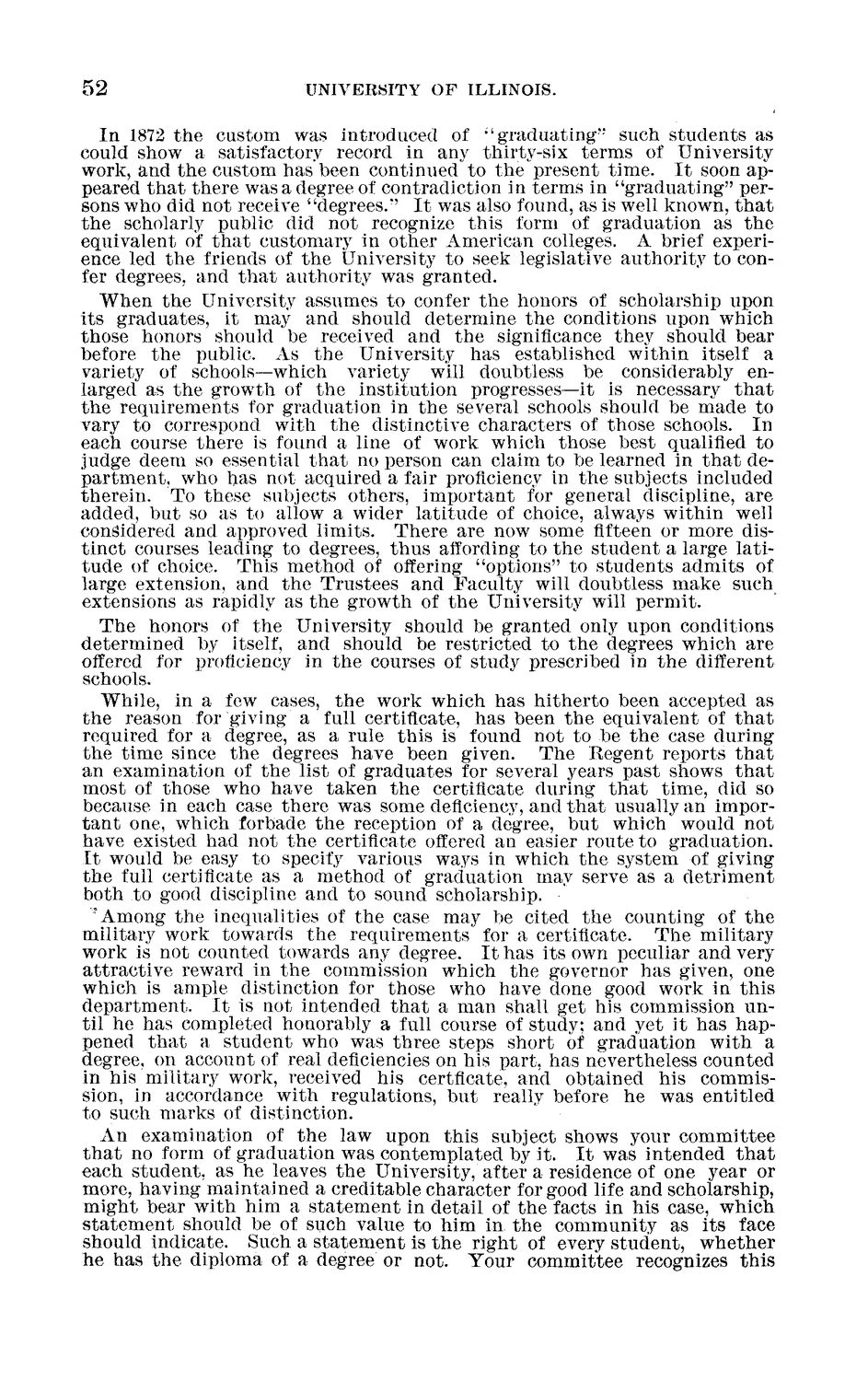| |
| |
Caption: Board of Trustees Minutes - 1890
This is a reduced-resolution page image for fast online browsing.

EXTRACTED TEXT FROM PAGE:
52 UNIVERSITY OF ILLINOIS. I n 1872 the custom was introduced of ''graduating" such students as could show a satisfactory record in any thirty-six terms of University work, and the custom has been continued to the present time. I t soon appeared t h a t there was a degree of contradiction in terms in "graduating" persons who did not receive "degrees." I t was also found, as is well known, t h a t the scholarly public did not recognize this form of graduation as the equivalent of t h a t customary in other American colleges. A brief experience led the friends of the University to seek legislative authority to confer degrees, and t h a t authority was granted. When the University assumes to confer the honors of scholarship upon its graduates, it may and should determine the conditions upon which those honors should be received and the significance they should bear before the public. As the University has established within itself a variety of schools—which variety will doubtless be considerably enlarged as the growth of the institution progresses—it is necessary t h a t the requirements for graduation in the several schools should be made to vary to correspond with the distinctive characters of those schools. In each course there is found a line of work which those best qualified to judge deem so essential t h a t no person can claim to be learned in t h a t department, who has not acquired a fair proficiency in the subjects included therein. To these subjects others, important for general discipline, are added, but so as to allow a wider latitude of choice, always within well considered and approved limits. There are now some fifteen or more distinct courses leading to degrees, thus affording to the student a large latitude of choice. This method of offering "options" to students admits of large extension, and the Trustees and Faculty will doubtless make such extensions as rapidly as the growth of the University will permit. The honors of the University should be granted only upon conditions determined by itself, and should be restricted to the degrees which are offered for proficiency in the courses of study prescribed in the different schools. While, in a few cases, the work which has hitherto been accepted as the reason for giving a full certificate, has been the equivalent of t h a t required for a degree, as a rule this is found not to be the case during the time since the degrees have been given. The Regent reports t h a t an examination of the list of graduates for several years past shows t h a t most of those who have taken the certificate during t h a t time, did so because in each case there was some deficiency, and t h a t usually an import a n t one, which forbade the reception of a degree, but which" would not have existed had not the certificate offered an easier route to graduation. I t would be easy to specify various ways in which the system of giving the full certificate as a method of graduation may serve as a detriment both to good discipline and to sound scholarship. "Among the inequalities of the case may be cited the counting of the military work towards the requirements for a certificate. The military work is not counted towards any degree. I t has its own peculiar and very attractive reward in the commission which the governor has given, one which is ample distinction for those who have done good work in this department. I t is not intended t h a t a man shall get his commission until he has completed honorably a full course of study; and yet it has happened t h a t a student who was three steps short of graduation with a degree, on account of real deficiencies on his part, has nevertheless counted in his military work, received his certficate, and obtained his commission, in accordance with regulations, but really before he was entitled to such marks of distinction. An examination of the law upon this subject shows your committee t h a t no form of graduation was contemplated by it. I t was intended t h a t each student, as he leaves the University, after a residence of one year or more, having maintained a creditable character for good life and scholarship, might bear with him a statement in detail of the facts in his case, which statement should be of such value to him in the community as its face should indicate. Such a statement is the right of every student, whether he has the diploma of a degree or not. Your committee recognizes this
| |